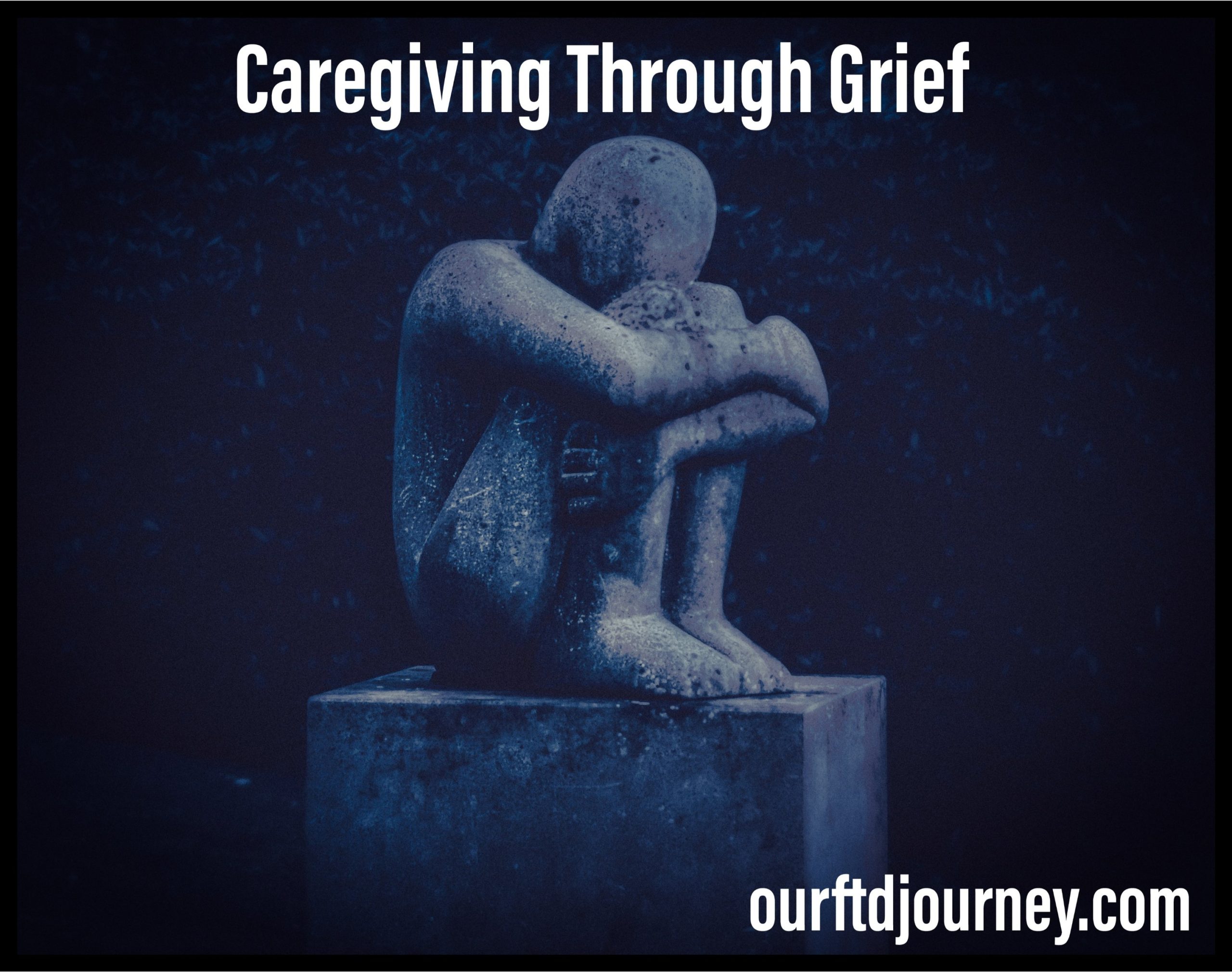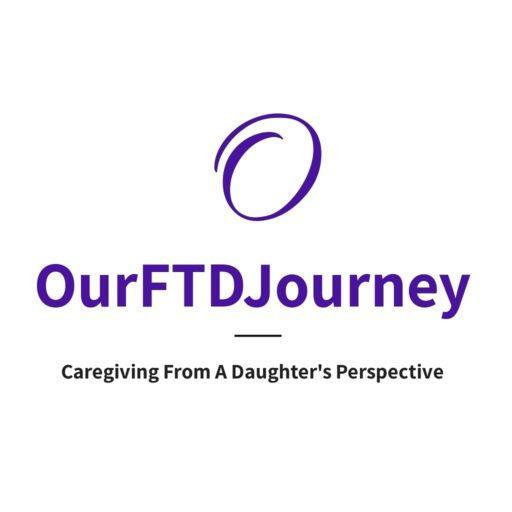Caregiving Through Grief
This post may contain affiliate links from Amazon.com, TheWrightStuff.com, flexoffers.com, and CaregiverProducts.com, which means I may recieve commissions if you choose to purchase through links I provide (at no extra cost to you). If you use any of my links, I greatly appreciate it!

If you are a caregiver for someone with dementia or any kind of terminal illness, chances are you have experienced some form of grief.
I know I have…it’s extremely difficult…and it hurts in ways that words don’t suffice.
There are two main types of grief caregivers experience:
Ambiguous Grief
Anticipatory Grief
Let’s talk about what this means:
Ambiguous Grief – Means you’re morning the loss of the relationship. The loss of how things used to be and will no longer be.
Anticipatory Grief – Means you know you’re loved one will die of their disease. You don’t know when. But, you know eventually it will happen. You know no matter how wonderful of a caregiver you are, and how much you love them, it won’t change that fact.
Grieving someone very much alive is tough.
I wrote about my experience with grief, in my previous post, “Oh, The Grief.”It’s tough.
Grieving someone alive feels unnatural.
You’re supposed to grieve someone AFTER they die. Not while they are still present in body and/or mind. Yet, here we are.
We grieve relationships. We grieve the role reversal of caring for parents or spouse.We grieve the loss of intimacy. We grieve the things they used to do that we took for granted.
Sometimes, the grief is so raw it can feel like everything hurts us and makes us cry.
Sometimes, we can find ourselves short with our loved ones, because we just want them back so badly.
Sometimes, we find ourselves crying into our pillows at night.
Sometimes, we hear a song on the radio that will trigger us.
Sometimes, we can be out and about and the grief will hit us like a huge wave.
Sometimes, we can find ourselves hard on ourselves for not being enough and not being able to bring the person we loved back.
Let me just say, you are enough.
Their decline has nothing to do with anything you did or didn’t do.
You’re doing the best you can. Your love, your devotion to your loved one, it’s enough. It’s always enough.
But, it’s hard to see and believe that when you’re in the throws of grief.It’s weird, we can be triggered any time or anyplace.
I, myself, have cried at my own doctors appointments and even in parking lots. I’ve cried myself to sleep. I’ve been through it; just like you.
It’s s weird, because, when you spontaneously breakdown, whether at home or in some random place, it can make you feel like you’re losing it. Like you’re broken and you’re never going to be okay ever again.
I can tell you for sure, yes, life has changed.
You have changed; but, you will be okay.You’re not losing it. You’re in pain…and that’s okay.

How to Cope with Grief
Getting through the grieving process is so difficult.
It’s a process that I recommend you don’t suffer through alone, if you can help it.
Going through this alone just makes the pain even more difficult.
So, what are some good coping mechanisms to get through this?
Let me toss some ideas out for you:
Find a friend that you can talk to – Not just any friend. But, a friend who has been through this themselves or someone who is compassionate enough to listen without judgment.
Journaling – Sometimes, we may not have anyone to lean on. Or maybe, we just aren’t ready to talk. That’s okay, too. Just find a way to get your feelings out.
Here’s a couple of links to our Etsy Page, if you would like to get one from us.
Our Spiral Journal…
Our Hard Cover Journal…
Also, here is an affiliate link to Amazon, if you would like to get one there.
Take a solo drive – I love to take a ride, when I just need to think things out and clear my head. Don’t drive if you’re in a crying fit. But, it’s an option if you just need to get away.
One of my favorite spots is a nearby lake. I find water so calming and soothing.
Grief Counseling – Grief counseling can be a good idea, it offers you the additional tools to work through your feelings.
Your loved one doesn’t have to already be gone to go through counseling.
Find a support group – I can tell you for sure that support groups have been very valuable for myself.
I have even built very close relationships with some people in my groups.
I admit, there are times where being vulnerable can be a challenge.
But, the close relationships I have built in my groups make it so much easier.
Some are closer to me than my own family.
Take a walk – Walks can be very calming and soothing. Especially now that, here in the USA, we are entering Fall soon. You’ll be surrounded by nature’s beauty.
Find other ways to connect with your loved one – So, the intimacy you once had with your loved one has diminished. But, intimacy can be had in many ways.
Look at photo albums with them. Listen to some music together. Cook a meal together. Be creative!I find even in the late stages of dementia, I can still connect with my mom. I’m thankful for the moments.
Cry it out – Yup! Sometimes a good hard cry or two or three will do. A
Sometimes, we just need to get it out.
Those are just a few tips and ideas. If I come up with anymore, I will update this post and add them.
If you have any ideas, leave a comment below. I’ll add them.
Final Thoughts
No matter where you are in the caregiving journey, it’s tough.
Dementia isn’t called “the long goodbye” for nothing.
Caring for someone with dementia feels like you are constantly battling against loss.
Because we are.
Our loved ones are constantly losing themselves and we are constantly losing them, until they take their final breath.
Then, the grief morphs.
You’re not alone.
Grief comes and goes in cycles and waves.
It can feel constant and all consuming. It can eat you alive. It makes you angry, sad, depressed.
Caregiving and grief are a roller-coaster of emotions.
Let me stress again, you’re not alone.
Every caregiver experiences this, and I’m no exception to the rule.
The only thing harder than being a caregiver and grieving is realizing the person we are losing is young and the future no longer looks like we thought it would be.
Things we took for granted are no longer an option.It feels so unfair.
Because it is…and coping with that realization, is probably the hardest of all.
Please feel free to share your thoughts in the comment section below.
Please share this post with anyone you think could benefit.
My question to you: How do you cope with the grief that comes with caregiving?

Comments